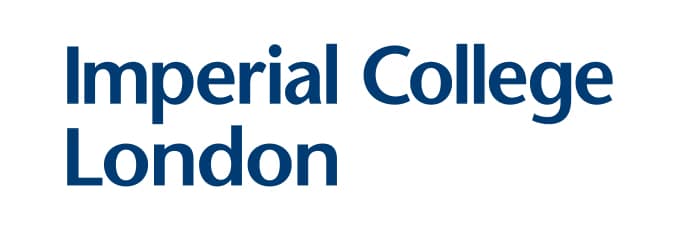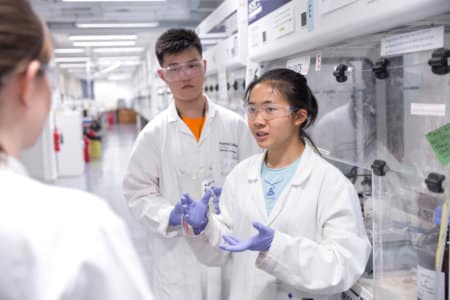Talented and driven staff and students. High-quality, cutting-edge and influential research. A diverse community that collaborates and innovates. These are just some qualities that make Imperial College London an amazing university — and one that’ll prepare you for your future careers.
If you’re into analysing the properties of substances, creating new compounds and materials, pushing our fundamental understanding of the world and making impactful developments in areas such as medicine, sustainable energy or catalysis, Imperial College’s Department of Chemistry can set you up for success in the modern world. Completing a bachelor’s or an integrated master’s degree here takes one on a journey that transforms students into future leaders of industries that may not even exist yet and into valuable citizens of today and tomorrow. Such is the power of a degree in the “central science.” Chemistry links mathematics and physics with life sciences and applied sciences — giving it a far reach, from developing pharmaceuticals that cure diseases to tackling climate change.
At Imperial College, a degree in this discipline confidently combines fundamental concepts with interdisciplinary topics and wider applications of chemistry. It’s a reflection of the university’s innovative teaching that’s research-based, student-focused, inclusive, diverse, evidence-based, outward-looking and enhanced by technology. What all of this results in, are students who can understand theory and apply this knowledge in practice, who are confident in data analysis, coding, problem-solving and communicating science. As graduates, you’ll not only be able to take all of these skills into your first jobs or further study, but also show in your CV, a degree that’s fully accredited by the Royal Society of Chemistry (RSC) and from a university that has a Gold award in the Teaching Excellence Framework (TEF).
Specialist courses at a global top 10 university
At the only UK university to focus entirely on science, engineering, medicine and business, programmes here are research-intensive, ranked amongst the best in the world and let students benefit from industry links well before graduating.
There are five undergraduate programmes that may be taken with a year working in industry, which allows students to gain paid experience of using chemistry in an industrial context. These programmes are the MSci Chemistry, MSci Chemistry with Medicinal Chemistry, MSci Chemistry with Molecular Physics, BSc Chemistry with Management, and MSci Chemistry with Research Abroad degrees.
Students take advantage of extensive industrial connections, with support from the department and careers service in finding placements and preparing their applications and for interview. Placements span across the chemical industry, from pharmaceuticals, biotechnology and healthcare, to materials science, agrichemicals, analytical development and industrial quality assurance.
The MSci Chemistry with Research Abroad programme includes an academic research placement and study at partner institutions in France, Germany, Spain, Switzerland, Canada, Singapore, the US, or Australia. For a unique all-rounded experience, the MSci Chemistry with Research Abroad and a Year in Industry degree contains both an academic and an industrial placement — the only Chemistry degree programme of its kind in the UK to offer this!
The BSc Chemistry with Management degree adds another layer of expertise for students. Following a three-year BSc in Chemistry, including a chemistry research project, it develops their management potential and business acumen, with a final year in the Imperial College Business School.
External contributions keep programmes up-to-date and relevant. MSci Chemistry with Medicinal Chemistry is taught by a mix of Chemistry lecturers and industry experts from the pharmaceutical sector, whereas faculty members from the Departments of Mathematics and Physics co-teach part of the MSci Chemistry with Molecular Physics programme.
Modules and courses from Year 3 onwards are research-inspired as well. They cover areas such as materials science, nanotechnology, drug discovery, catalysis, chemical biology, sustainability and renewable energy.
i-Explore allows Year 3 Chemistry undergraduate students to earn credit from a range of subjects from other departments at Imperial College. They can pick from four categories: Imperial Horizons; Business for Professional Engineers and Scientists (BPES); Science, Technology, Engineering, Maths and Medicine; and Multidisciplinary Projects.

Imperial College believes in the value of practical education. Source: Imperial College London
Impactful teaching, learning, and community initiatives
When the COVID-19 pandemic pushed study online, the “Lab-in-a-Box” team was determined to ensure those studying remotely could continue to engage with practical chemistry and develop their experimental and analytical skills. They brought together people from across the department to develop bespoke learning approaches, resources and instruments for students across Years 1-3. They built large quantities of custom equipment and ensured smooth logistics while delivering experimental kits to students at home across the world.
The team developed a chemistry/molecular gastronomy experiment to do in your kitchen at home, a kit to practise authentic synthetic chemistry techniques, custom-developed, 3D-printed control modules enabling students to build Lego spectrometers for UV-visible and fluorescence spectroscopy. It was an incredibly successful project that saw the “Lab-in-a-Box” team winning the Royal Society of Chemistry’s 2022 Team Prize for Excellence in Higher Education.
“Chemistry is a great enabler of all other natural sciences. It provides a versatile toolbox for addressing some of the most significant scientific, economic and social grand challenges that we face today, such as climate change, the generation of novel materials, drug discovery and building artificial cells in the lab,” says Dr. Alex Ivanov, a Lab-In-a-Box team member.
Facilities at the 170 million pound Molecular Sciences Research Hub (MSRH) — which houses the Department of Chemistry’s research groups and other scientists — encourage more collaborative scientific working among students and staff. Here, researchers from a range of backgrounds address common challenges in areas such as energy, healthcare, and sustainability. Students undergo research projects, benefitting from world-class facilities and open-plan lab spaces at MSRH.
To support learning in Chemistry at Imperial College, initiatives such as i-Engage have been rolled out to guide students in their personal development every step of the way.
During the first year, i-Engage helps students to integrate within the university’s community and culture, which includes group projects and giving feedback to their peers. In the second year, i-Engage trains students to think of the values and considerations vital to professional chemists — both within and outside the university. They learn to value inclusivity and become effective collaborators within their community.
That’s not all. All undergraduates in Imperial College’s Department of Chemistry are automatically members of ChemSoc (the Chemistry Society) and the Royal College of Science Union, free of charge. ChemSoc brings students together all year round, organising quiz nights, coffee breaks, competitions, Christmas and finalists’ dinner events, plus wide-ranging career events, workshops and seminars.
Hans Chan, a BSc Chemistry graduate, was part of the Robotics and Drone society as well as the tech entrepreneurship competitions hosted by Imperial College. The highlight of his time here was winning the FoNS MAD competition with his colleagues and then creating a startup company from that. “It was an incredible journey, starting from just a vision, then communicating it to get funding, using said funding to develop the substance of the idea, and finally taking that to a viable business,” he said.
Chan credits his success to the incredible opportunities set forth by Imperial College’s Department of Chemistry. “Imperial is more than just an academic institution – there is a culture of facilitating innovation and helping students to implement and execute great ideas, which you might not find in a pure research environment,” he says.
Follow the Department of Chemistry on X.
Follow Imperial College London on Facebook, Instagram, X, and YouTube












